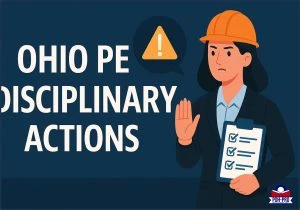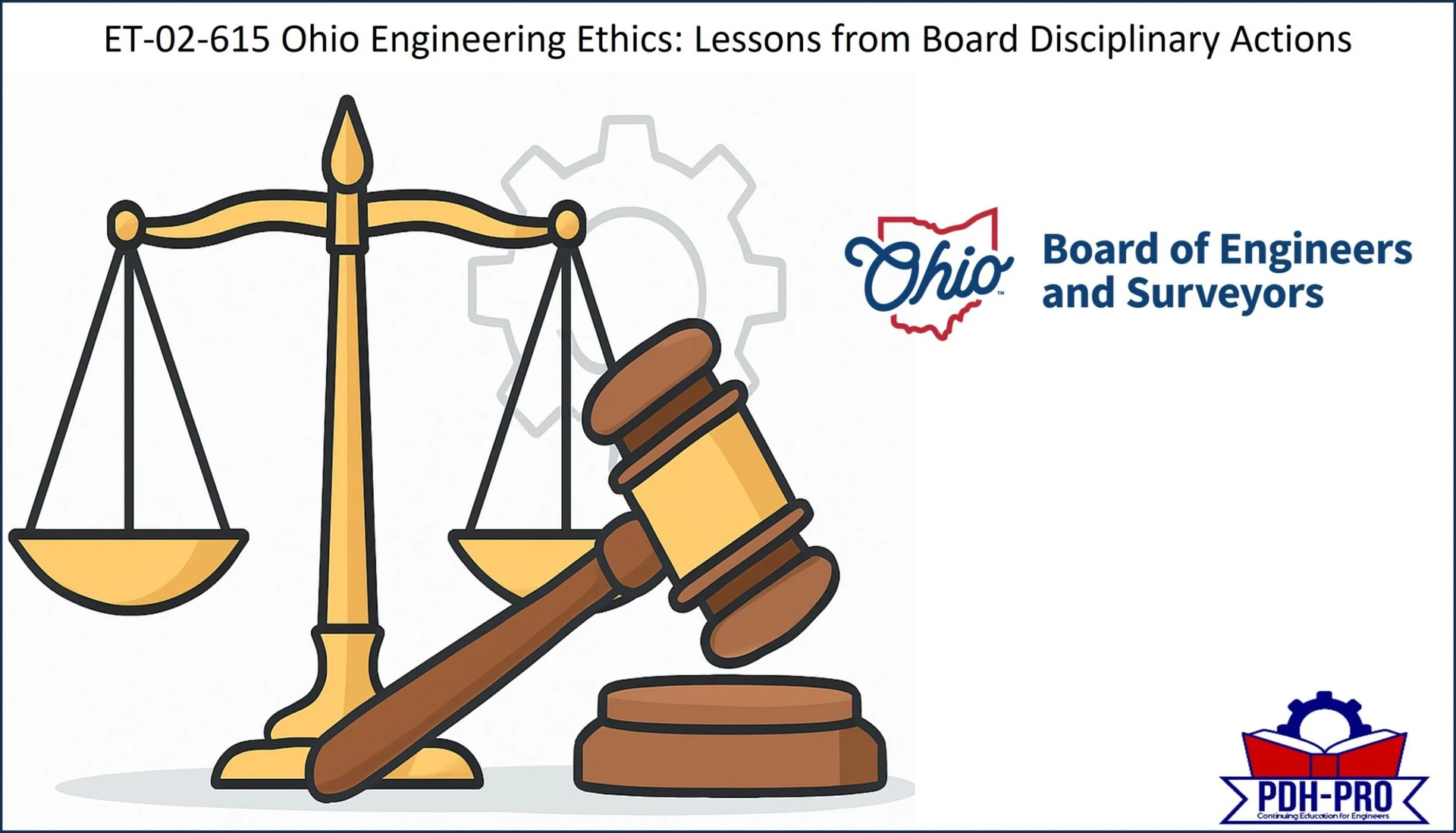
Written by: Jordan Ellis, PE
Published: June 30, 2025 | Updated: November 20, 2025
As a licensed professional engineer, I take pride in upholding the standards of our profession. But I also know that staying in compliance with licensing laws and ethical expectations isn’t always as straightforward as it sounds. That’s why I make a point to regularly review disciplinary actions issued by the Ohio Board of Engineers – because they offer real-world reminders of how important it is to get things right.
In this article, I’ll walk you through recent Ohio PE disciplinary actions and what we can learn from them. These aren’t just cautionary tales – they’re a roadmap for staying out of trouble. From missed renewals to misrepresenting credentials, the details show how small lapses can quickly escalate into major problems. If you’re a PE in Ohio, this is your opportunity to learn from others’ mistakes and double-check your own practices.
Ohio enforcement patterns reflect the same risk categories emphasized in the broader staying ahead of professional engineer disciplinary actions analysis, particularly regarding ethics reporting and misrepresentation of qualifications. You may enjoy my article What are the Most Common Ethics Violations for Professional Engineers.
Ethics Course for Ohio Engineers

This one-hour online course helps Ohio Professional Engineers earn guaranteed PDH credit while deepening their understanding of ethical responsibilities and state board regulations. By studying real disciplinary cases, participants will learn to recognize common violations, navigate the Ohio Board’s disciplinary process, and apply practical strategies to maintain compliance and protect their professional license. Ideal for engineers committed to upholding public safety and the highest standards of integrity in Ohio.
Summary of Violations
To better understand the disciplinary landscape in Ohio, I reviewed several recent enforcement actions issued by the Ohio State Board of Registration for Professional Engineers and Surveyors.
The table below summarizes the most common types of violations, how frequently they occurred, and the penalties imposed.
| Violation Type | Number of Cases | Typical Penalties | Fine Range |
| Failure to Renew License | 4 | Reprimand, $250 fine | $250 |
| Unlicensed Practice | 3 | Reprimand, $500–$1,000 fine | $500 – $1,000 |
| Failure to Notify Board of Changes | 2 | Reprimand, $250 fine | $250 |
| Practice Without COA (Certificate) | 1 | Reprimand, $250 fine | $250 |
| Misrepresentation / False Statements | 1 | Reprimand, $250 fine | $250 |
| Other Administrative Violations | 2 | Reprimand, fine, required documentation | $250 – $500 |
These numbers reflect patterns that every Ohio PE should take seriously. Even administrative oversights, like not reporting an address change, can lead to board action and public reprimands. In one matter, the Board disciplined an engineer who provided services on over 200 projects without a firm COA and who also had prior discipline from the Kentucky Board for aiding and abetting unlicensed practice.
Connections between Ohio cases and real Arkansas engineer discipline cases and lessons reveal shared vulnerabilities in project documentation and contract compliance.
Why Ethics and Compliance Matter for PEs
As licensed professional engineers, we have a legal and ethical obligation to protect the health, safety, and welfare of the public. This is the foundation of our license and the reason the profession is so highly regulated. Our decisions can impact the structural integrity of buildings, the safety of public infrastructure, and the reliability of critical systems.
Maintaining compliance with licensing rules and ethical standards is not just a formality. Even seemingly minor lapses, like failing to renew a license on time or forgetting to update your contact information with the board, can result in disciplinary action. These violations may appear small but can carry significant consequences, including public reprimands, fines, suspension of licensure, and reputational damage. In a field where trust and accountability are essential, every detail matters.
Several of Ohio’s disciplinary themes are echoed in Kentucky PE disciplinary actions as a cautionary tale, demonstrating how inconsistent oversight and incomplete engineering work can lead to significant sanctions.
Real Examples of Violations
Understanding how violations occur helps us avoid making the same mistakes. Here are a few real cases from Ohio that highlight common issues and the serious outcomes that followed.
Practicing Engineering Without a Valid License
One engineer continued offering engineering services after their Ohio license had expired. Despite multiple reminders from the Board, they failed to renew in time but still signed and sealed documents. The result was a public reprimand and a $1,000 fine. This case is a reminder that even brief lapses in licensure can carry real penalties, especially when practicing without active authorization.
The improper use of a professional seal can lead to significant penalties, as seen in a recent West Virginia case involving multiple seal violations on a single project.
Misrepresentation of Qualifications
Another case involved an engineer who misrepresented their qualifications on a project submittal. Although licensed in another state, they implied Ohio licensure and submitted plans bearing their out-of-state PE seal. The Board found this misleading, issued a public reprimand, and imposed a $500 fine. It serves as a warning to clearly state licensing status and not overstate qualifications.
Failure to Report Out-of-State Discipline
One professional engineer had been disciplined in another state but failed to report this to the Ohio Board as required. When discovered, Ohio imposed its own disciplinary action, including probation and a $250 fine. This underscores the importance of transparency. All disciplinary actions, even those in other states, must be disclosed to the Ohio Board within the required timeframe.
Each of these cases involved decisions that may have seemed minor or justifiable at the time. But they show how quickly small errors in judgment or oversight can escalate into official board action. Staying informed and diligent is the best way to protect your license and reputation.
Penalties and Fine Ranges
The consequences for violating Ohio’s engineering regulations go far beyond a simple fine. Financial penalties, reputational damage, and the potential loss of your license are all on the table when ethical or legal obligations are ignored.
Fines issued by the Ohio Board of Engineers typically range from $250 to $1,000 depending on the severity and nature of the violation. For example, failing to report discipline in another state might result in a $250 penalty, while practicing without a license can lead to fines of $1,000 or more.
In addition to fines, disciplinary actions often include:
- Public reprimands, which become part of the public record and can affect your credibility with clients and employers
- License suspensions or probation, which may restrict your ability to practice or impose specific compliance conditions
- Permanent revocation of licensure, in the most serious or repeated offenses
Even when fines are modest, the long-term effects – damaged reputation, lost business opportunities, and diminished professional trust – can be much more costly. Every Ohio PE should treat these consequences as a serious reminder to stay compliant.
How to Stay Compliant as an Ohio PE
Staying in good standing with the Ohio Board of Engineers isn’t complicated, but it does require attention to detail and a proactive approach. These simple actions can help you avoid disciplinary action and protect your professional reputation:
- Renew your license on time
Missing a renewal deadline, even unintentionally, can lead to practicing without a valid license, one of the most common violations. - Keep CE documentation organized
Maintain clear records of your continuing education hours in case you’re selected for an audit. Make sure courses meet Ohio’s “timed and monitored” requirement. Failing to respond to a Continuing Professional Development audit is a violation in itself, a lesson also highlighted in recent disciplinary cases from South Carolina. - Report out-of-state disciplinary actions
If you’ve been disciplined in another jurisdiction, you’re required to notify the Ohio board. Failing to do so is a violation in itself. - Don’t practice if your license is lapsed
Even brief lapses can result in formal charges. Check your expiration date and set reminders well in advance of deadlines. - Respond promptly to board communications
If the board contacts you, respond immediately. Ignoring a request for information or clarification can escalate the situation quickly.
Being proactive and organized can help you steer clear of costly mistakes and reinforce your commitment to professional excellence.
Conclusion
As licensed professional engineers, we carry the responsibility to uphold the highest standards of ethics, safety, and public trust. Even seemingly small oversights, like forgetting to renew a license or missing a reporting deadline, can lead to serious consequences.
By staying informed, organized, and proactive, we not only protect our licenses but also demonstrate the professionalism that defines our field.
